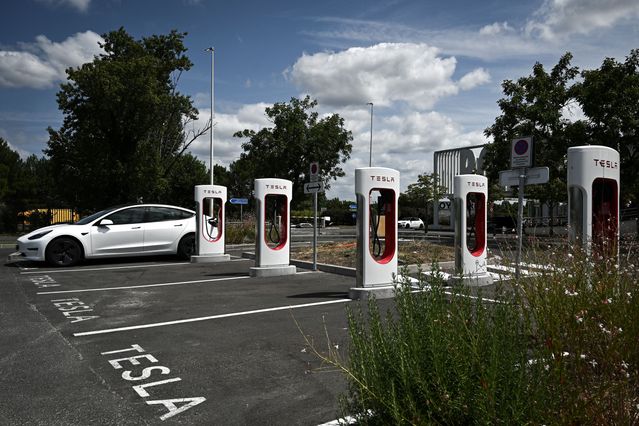Tesla is the most valuable car stock on the planet and one of the most volatile and heavily traded stocks in the U.S. All that makes it a magnet for news. Learning how to deal with all the stories is important for investors.

Take this week. Investors had to digest news about a California investigation into the company’s autonomous driving features, reported by CNBC on Wednesday, as well as potential problems with Tesla (ticker: TSLA) service and battery range, reported by Reuters on Thursday. Tesla didn’t respond to a request for comment about the issues. Investigations, range questions, and poor service all sound serious.
They aren’t all that important for valuing Tesla stock. That might sound somewhat controversial. Certainly, some issues matter a lot, but not everything has the potential to impact Tesla stock to the same magnitude.
Still, self-driving sounds like it should matter. Just ask CEO Elon Musk. “I think the Tesla fleet value increase at the point in which we can upload full self-driving and is approved by regulators will be the single biggest step change in asset value maybe in history,” said Musk on the company’s second-quarter earnings conference recall. That’s not the first time he has said that.
A California investigation might derail the value increase. Maybe. But investors take Musk’s statements about self-driving with a grain of salt. Even Musk calls himself the “boy who cried FSD,” referring to his frequent proclamation that Tesla’s Full -Self Driving software was almost ready to drive cars without human supervision.
What’s more, an investigation wouldn’t mean cars never drive themselves. The outcome of the California investigation most likely would result in changes to Tesla’s marketing and potential refunds for disgruntled customers.
Barron’s took a stab at sizing refund risk. Tesla has taken in roughly $6 billion in revenue related to sales of its Full Self Driving, or FSD, software. Perhaps $2 billion of that has been recognized in operating income. That is almost 10% of the operating income reported over the past two years. Big, but not everyone would demand or likely get a full refund.
The California investigation is a zero to $2 billion headache for a stock worth more than $800 billion. Investors appear right to dismiss it. They should focus on how fast Tesla’s autonomous-driving features are improving and what the rest of the industry is doing.
Service quality and electric-vehicle range, of course, matter too. The Reuters report pointed out that Tesla vehicles get less than the advertised per charge range in the real world and also that Tesla owners have run into trouble with the company’s service department.
All EVs get less than the advertised range based on weather and driving habits. Blasting the AC and stomping on the accelerator will drain batteries faster than advertised. As for service, no one, whether an owner of an EV or gas-powered car, likes to deal with auto service. Appointment times are rising, according to J.D. Power.
What matters for investors is whether Tesla’s range is better than others and if it achieves that range with more batteries or better design than other auto makers. It also matters if EV buyers can recharge easily, which is why Tesla has built the largest fast-charging network in the U.S.
If Tesla systemically overstates range, and there is no indication it does, then investors would have to move on to valuing the problem like the California issue.
There is some history that helps. Volkswagen (VOW3.Germany) has spent roughly $35 billion on a diesel emissions scandal that might have impacted up to 11 million cars.
Tesla has sold about 4.5 million cars worldwide. At a similar per-car rate, assuming every car was impacted, a Tesla range problem could be a $15 billion issue. That’s the upper end of the problem. (Some of VW’s spending was due to the health impacts of diesel emissions).
That’s a lot of money, but investors tend to ignore the potential because the odds of an issue are small. One way investors can see if any issue will impact a stock is to multiply the odds by an amount. That’s called an expected value calculation.
A 5% chance of something being wrong and $15 billion amount means Tesla stock should reflect $750 million for range issues. That’s only 0.1% of the market cap. That’s too small to be detectable.
The ultimate check for investors with any of these issues might be buyer behavior. Most Tesla buyers seem happy enough. Tesla is a car industry leader in brand loyalty. People who buy a Tesla often continue buying the brand.
Tesla stock rose 4.2% on Friday. The S&P 500 and Nasdaq Composite rose up 1% and 1.9%.
Comments